During the 14th Five-Year Plan period (2021-2025), China is about to enter a stage of moderate ageing, and it coincides with the only-child generation entering middle age with the need to gradually face the issue of their parents’ retirement. When an ageing society collides with the only-child generation, how helpful is the integrated elderly social care policy to young people in China?
After living and working in Australia for 13 years, Doudou Li finally gets her parents to emigrate from China to Australia. As an only child, she had to find ways to support her parents, which was her responsibility, but having lived abroad for many years, she did not have the opportunity to be by their side to look after them as they grew old.
Although her parents still live in China recently and spend some time visiting her in Australia every year, she no longer has to worry about her parents’ retirement life. As her parents get older and unable to travel long distances across the world, she plans to bring them to live with her and look after them without giving up her own life in Australia.
In terms of personality, Doudou Li’s parents now can adapt well to life in Australia, despite the fact that the culture and habits are very different from those in China. They can travel around on their own by train and bus to enjoy the good life.
“Mainly from a health care resource point of view,” she says, “If my parents are unwell and need to see a doctor in Australia in the future, I will save on the medical bills without spending an extra money. They also save on the annual cost of a visa for visiting at any time when they want to see me after emigrating.”
After spending more than 40,000 Australian dollars in fees and a long wait, her parents were finally able to obtain visas to migrate to Australia. This is not a very easy process, but the results really helps her out.
For her, the choice to emigrate with her parents was the best way of life for her parents to retire based on her family’s financial situation and her parents’ willingness to do so. A good balance exists between her parents’ retirement and her life.
However, not all people have the financial capacity to afford the expensive visa fees, nor does everyone have the will and opportunity to emigrate. But in China at the moment, most adult children have the heavy responsibility of providing for their parents’ retirement on their shoulders and will be facing this problem in the near future.
The results of the seventh national census, conducted in China between 2020 and 2021, show that the population of the country is 141.78 million, an increase of 72.06 million or 5.38% compared to 2010 (the sixth national census), with an average annual growth rate of 0.53%, 0.04 percentage points lower than the average annual growth rate from 2000 to 2010.
In the context of such a large population, the population of older people is also growing rapidly. According to the figures made public by National Bureau of Statistics, China’s population aged 60 and over is 264.02 million, or 18.70%, up 5.44 percentage points compared to a decade ago; 16 of the country’s 31 provinces have more than 5 million people aged 65 and over.
Jizhe Ning, director of China’s National Bureau of Statistics, pointed out at the press conference that “Population ageing is an important trend in social development and a key national situation in China for a longer period of time in the future.” As China is facing a difficult social ageing problem, the growing number of elderly people brings with it many needs and challenges for both the elderly and their children. This pressure is even more apparent and unavoidable for only children generation.
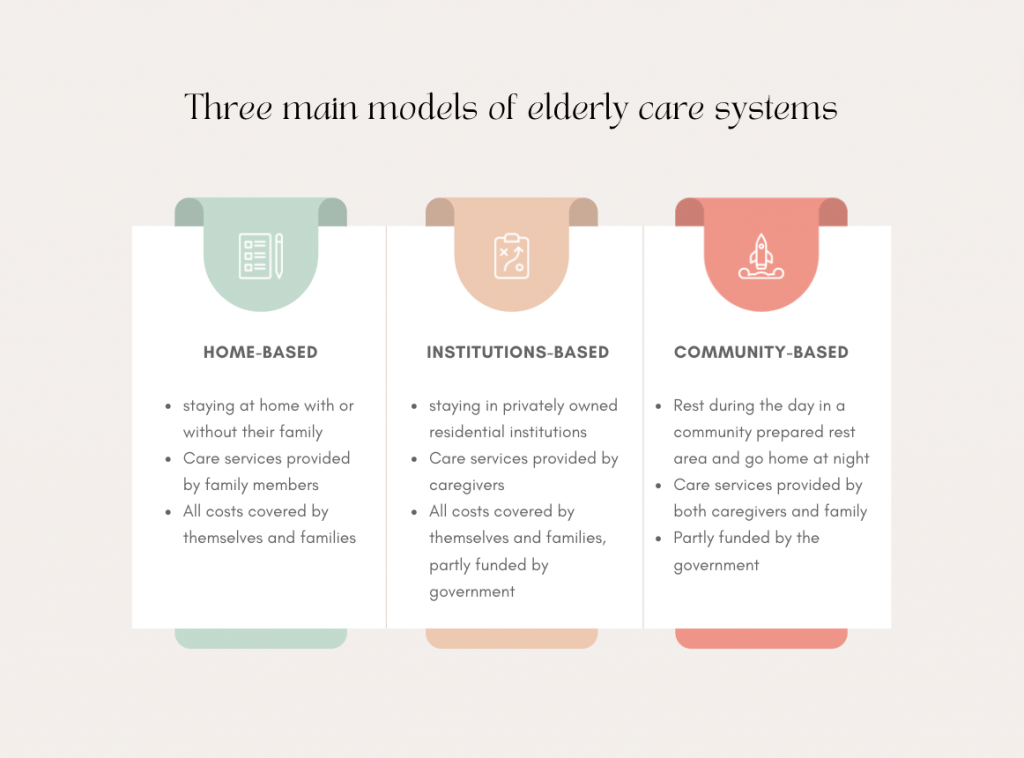
In 2015, the Chinese government launched an integrated elderly social care policy for older people in an attempt to ease the pressure on society as a whole and provide better services for older people and relief for their families.
According to the Opinions of the State Council on Accelerating the Development of the Elderly Service Industry states, the integrated elderly social care mainly refers to the provision of medical and health care services for elderly people who are living at home, in the community or in institutions, on top of basic life care services.
This policy also gives the elderly a chance to live their lives as desired in their old age. “ We don’t want to live a child-centred life when we get old. We’ve worked hard for half my life, shouldn’t we live the rest of our life for ourselves?”says the 60 year-old parents of Ms Lee, who is living and working in the United States at present. In fact, both of her parents can speak English but they still decide not to go to the US to stay with their only daughter when they retire in the future.
Lee says that her parents have already taken out expensive insurance for themselves, which is the kind of insurance that enables them to book a reservation for a place in a premium retirement home of a chain brand, Taikang Retirement Homes, across the whole country.
As a high-class retirement community, in addition to the tranquil and beautifully landscaped gardens and exquisite furnishings, the nursing home also offers excellent medical resources and a bespoke care programme. The practice of embedding medical resources in nursing homes is not only in line with China’s policy of encouraging integrated elderly social care policy in order to address the difficulties of ageing society, but also improves the quality of life of the elderly and has become popular.
Over these years, the integration of medical and health care for the elderly has developed relatively quickly and received widespread attention from all walks of life, especially the elderly people with incapacity and dementia.
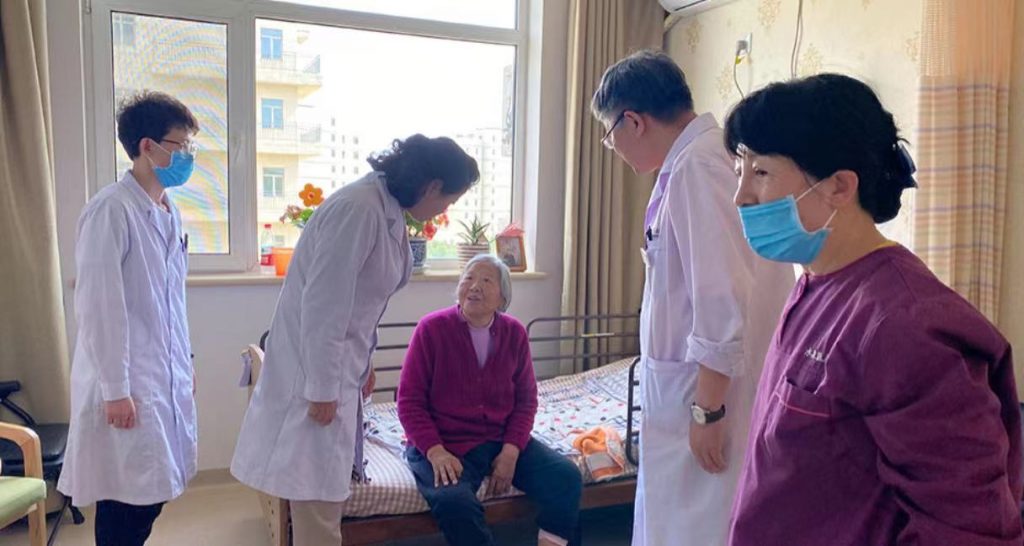
In northeast area of China, Delan Medical Healthcare Group operates a big famous chain brands of integrated retirement homes. As one of the onwers of Delan, Rui Ding is managing retirement homes in Shenyang and Dalian, the capital city of Liaoning province.
“Our first combined medical and nursing home opened in Dalian, not in Shenyang, the provincial capital of Liaoning, and at that time we still had day care,” Rui Ding says, “but our later establishment in Shenyang was so popular that there were no longer enough beds to provide full day care services. “
However, due to China’s traditional cultural background, integrated elderly social care policy does not really help everyone or most people in a practical and effective way at present. In order to ease the problem of an ageing demographic, Chinese government also try another solution to release the problem of aging society.
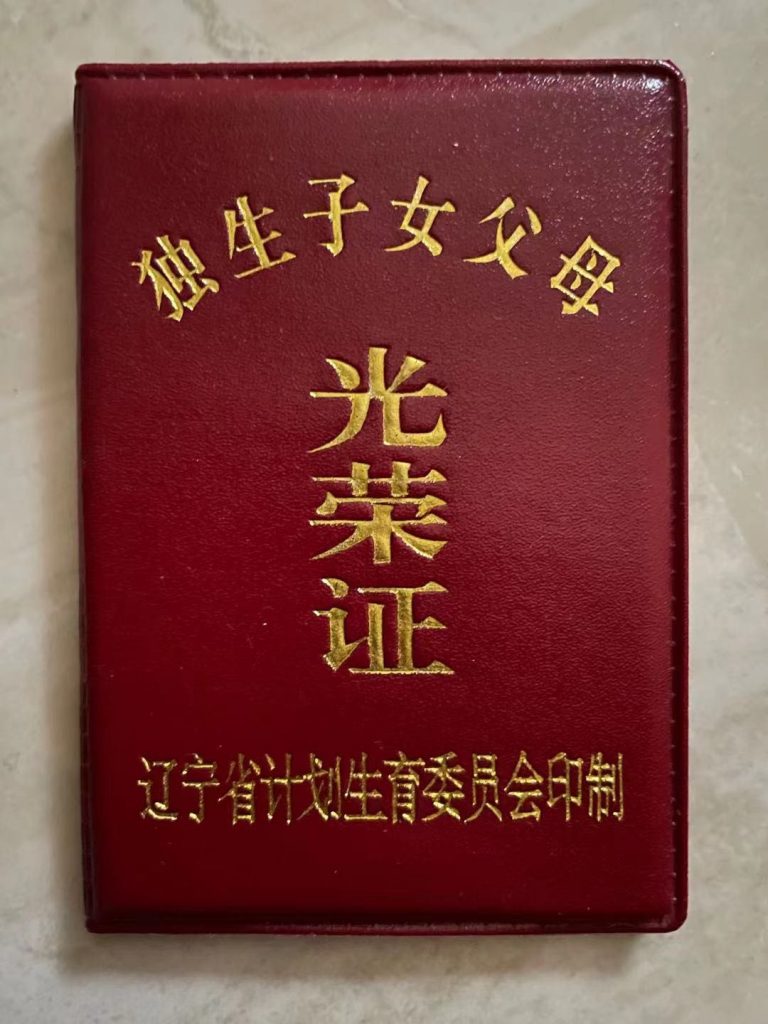
On 1 January 2016 China passed a law encouraging every couple to have two children, which officially put an end to the one-child policy that had been in place since 1982, restricting a couple with only one child. The children born during this period now have become a special generation.
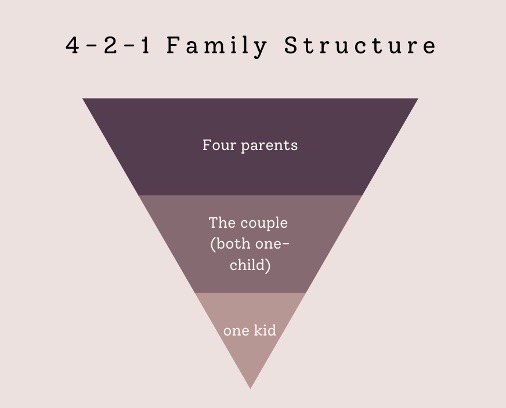
For some of the only children, dealing with the retirement of their parents might be painful. This is because they are often in a 4-2-1 family structure, which means that a couple has to provide help for four elderly people after they retire and take care of one child. Their responsibilities include both the everyday routine and the psychological side, and sometimes financial support may be required, if their parents’ pension can’t cover their living expense or they don’t have pension. This may involve many conflicts, for example, between the work plans or personal lives of children and the responsibility of supporting their parents.
“I still want my parents and grandparents to be able to stay at home when they retire and be taken care of by me in the future,” Guangbin Xue says, “The city I work in now is only about an hour away from my hometown by high-speed train, so it’s still easy to get home to visit my family when they need me.” Just like Dawi Fu, Guangbin is also one of the large number of people who are still keen for his family to stay at home, not in retirement homes in their retirement, with him looking after them in their time of need.
Guangbin Xue is now working in Dalian, Liaoning province, the city right next to his hometown. He came to Dalian for university and stayed here for a better job. As an ambitious young person, he wants to go to southern part of China to achieve a higher stage in his career, but the responsibility of taking care of his family has always been a massive part in his heart, which stops him from going further.
This parent-child reciprocal relationship is an expression of the filial tradition, in which parents bring up their children in the hope that they will exercise their duty of support in their own old age. The connection between parents and children is very strong, and an analysis of the composition of Chinese characters shows this graphically.
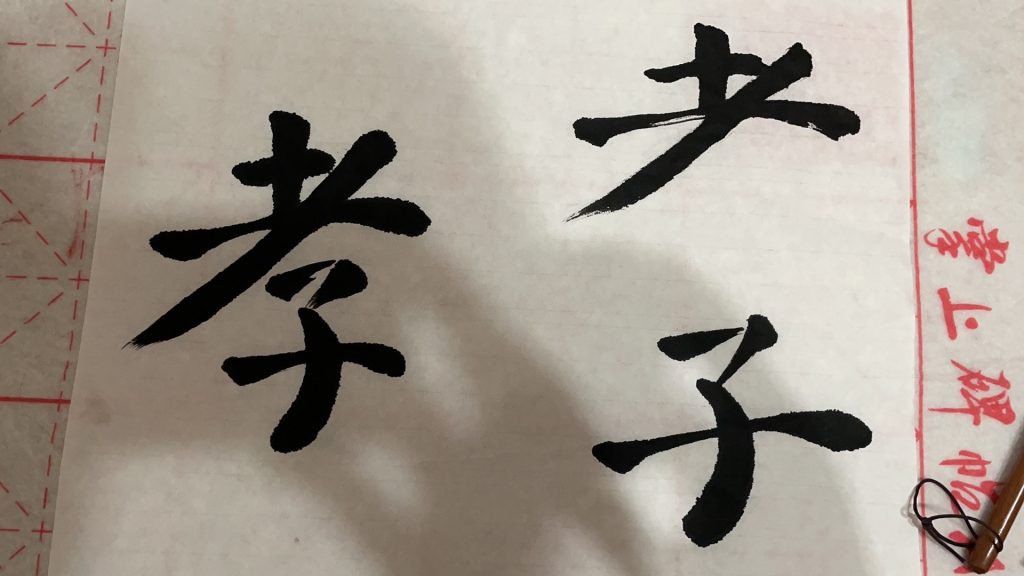
The Chinese character “filial” is made up of two parts, the upper part representing “old” and the lower part representing “son”, which means that children should take the responsibility for their parents. That is to say that in today’s Chinese society, which is governed by the culture of filial piety, the question of how to take care of and arrange for their parents’ retirement life is a moral issue that young people must cope with.
Under the background of Chinese filial culture, the deep ties between parents and children, both emotionally and financially, has made the policy of integrating elderly social care not a very efficient solution for the majority of the population in recent years.
This is because some of people, including old people and young people, don’t really believe in the retirement homes, no matter if it provides medical services or not. Dawi Fu insists that for parents, the company of their families is better than anything else.
“I’m definitely going home to take care of my parents in the future,” Dawi Fu said, “They raised me so well that they can’t bring up a son for nothing.” He has been working in the Netherlands for a year now, after completing his two-year master’s degree. But when it comes to his parents’ old age, he says he would be very determined to put aside his career in Netherlands and return to his family at once if they needed to be taken care of.
Like dawi, Guangbin, who dislikes nursing homes, has different considerations. “Most people of my parents’ generation or older are thrifty,” he says, “and the elderly in the family have been saving money all their lives, so how can they afford to spend a lot of money on a nursing home?”

People who benefit from integrated elderly social care policy are mainly open minded and in good financial position, while there are still many old people and their children who can’t afford the expense of retirement homes.
The government is encouraging homes with the capacity to integrate medical care to provide home-based services by giving them funding to meet the elderly’s preference to stay at home, while also addressing their need for medical resources. Rui Ding says that she hopes that more elderly people can be helped by this policy. “The more developed cities, such as Shanghai, are already piloting this new approach,” she says, “and the north-east is still a bit behind, but our team is already planning for it.”
